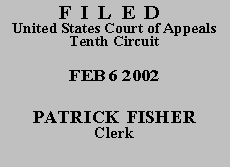

| UNITED STATES OF AMERICA,
Plaintiff-Appellee, v. LOUISA M. LUCERO, Defendant-Appellant. |
|
Defendant Louisa Lucero pleaded guilty to false impersonation of a federal employee, a violation of 18 U.S.C. § 912. In exchange for her guilty plea, the government agreed to dismiss the two other charges remaining from her indictment. The government also agreed that she was entitled, under the governing sentencing guidelines, to a reduction from the base offense level, because she accepted responsibility for her offense. During the presentence investigation, Ms. Lucero provided a letter from her doctor, purportedly discussing various medical problems from which she was suffering. The letter, Ms. Lucero later admitted, was not written by her doctor nor did he know that it was sent over his signature. Ms. Lucero told the sentencing court that she obtained the letter from a friend who worked in the doctor's office.
At sentencing, Ms. Lucero agreed with the government that the submission of the false letter barred her from receiving the reduction for acceptance of responsibility. She objected, however, to the sentencing court's decision, again as a result of the letter, to impose a two-level increase on her for obstructing justice within the meaning of USSG § 3C1.1.
Ms. Lucero appeals that sentencing ruling. Her appellate counsel submitted a brief pursuant to Anders v. California, 386 U.S. 738 (1967), stating that there were not meritorious issues on appeal. In particular, it stated that in imposing the two-level increase for obstruction of justice, the sentencing court correctly applied the sentencing guidelines. We agree.
To enhance a sentence under USSG § 3C1.1, the government must show that the defendant acted consciously, with the specific purpose of obstructing justice. United States v. Hernandez, 967 F.2d 456, 459 (10th Cir. 1992). When the enhancement is based on false statements, the government must prove, among other things, that the statements were material. See United States v. Copus, 110 F.3d 1529, 1536 (10th Cir. 1997). We agree with the district court's conclusion that the forged letter is a material false statement, since it contained "information that, if believed, would tend to influence or affect the issue under determination." USSG § 3C1.1, n.6.
The judgment of the United States District Court for the District of Colorado is AFFIRMED. Defense counsel's motion to withdraw, pursuant to Anders v. California, is GRANTED
Entered for the Court
Circuit Judge
*. This order and judgment is not binding precedent, except under the doctrines of law of the case, res judicata, and collateral estoppel. The court generally disfavors the citation of orders and judgments; nevertheless, an order and judgment may be cited under the terms and conditions of 10th Cir. R. 36.3.